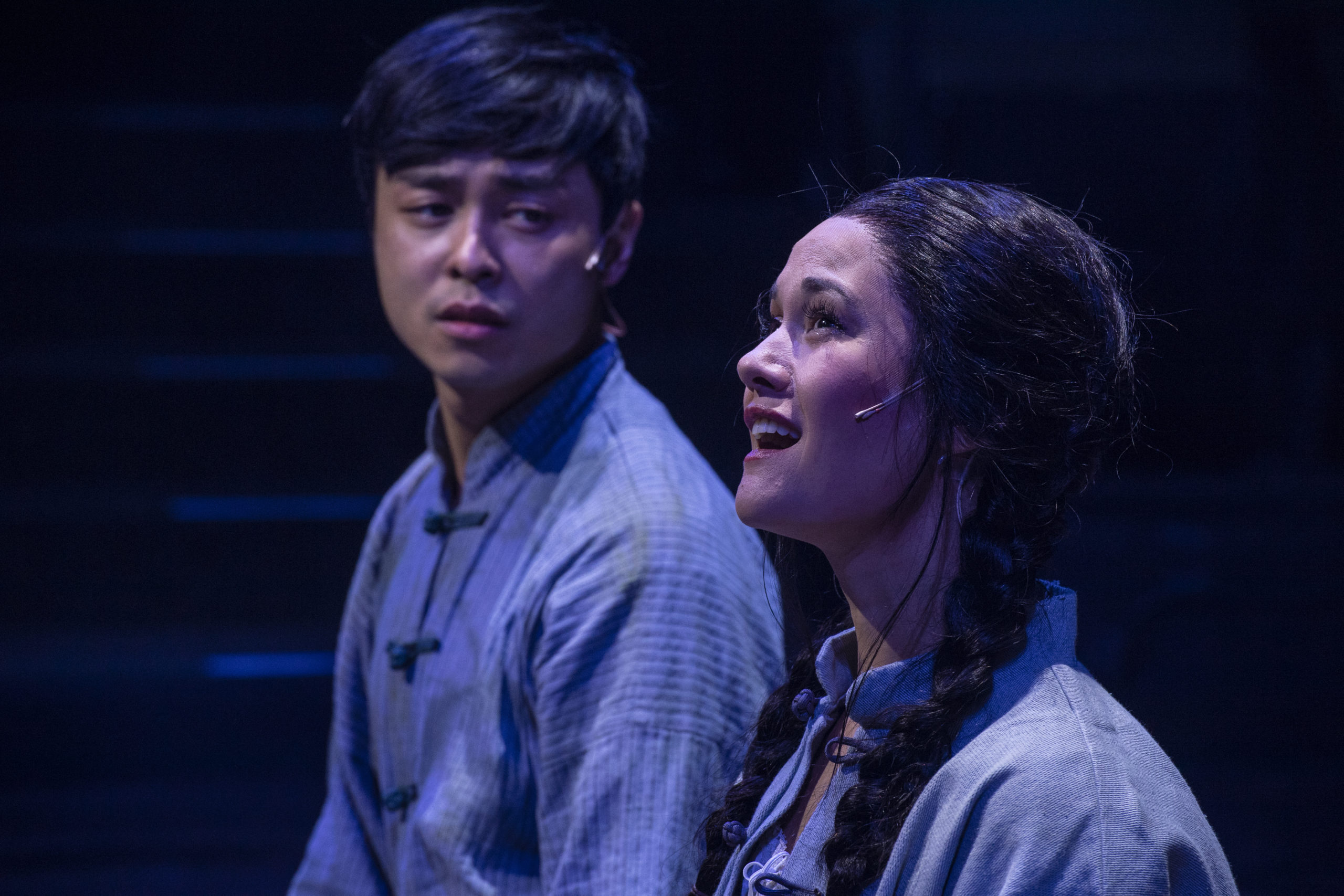WEST VALLEY CITY — The Utah Shakespeare Festival is venturing into new territory by producing their first full production in the Salt Lake metro area. Gold Mountain is a new musical by Jason Ma receiving its world premiere at the West Valley Performing Arts Center. In 2019, Gold Mountain was performed as a staged reading as part of the Spike 150 celebration of the completion of the transcontinental railroad. The play tells the story of a camp of Chinese labors building the railroad in very dangerous conditions in the Sierra Nevada mountains in 1866. It is also a love story between two young immigrants who are willing to give everything they have for love and family.

The production quality, under the direction of Alan Muraoka, is in keeping with the Festivals’s high standards. Beautiful, effortless looking costumes, designed by Helen Q. Huang, adorn every actor. Lights (designed by Jaymi Lee Smith), sound (designed by Jennifer Jackson), and a beautiful, functional set (designed by Jo Winiarski) leave nothing to be desired. The performances by each of the thirteen ensemble members are strong. In group numbers the actor’s voices are beautifully blended under Amanda Morten’s music direction. Billy Bustamante’s choreography captures and heightens the emotions of each song and the whole production is supported by Steven Cuervas’s orchestrations and the fantastic four-piece music ensemble.
The melodies are lovely and well-paced within the storytelling ranging across a variety of styles. A highlight of the show was a scene in act two when two of the laborers perform, after much practice and comic strife, a traditional Chinese opera complete with beautiful costumes, makeup, and dance.

Sadly, all the effort and energy around this production cannot save it from what is, on the whole, a tiresome libretto that hinders character and plot development. Not uncommon for a new work, the songs in Gold Mountain are overly long. They would benefit from shedding one or more verses and packing in more complexity to the history and the character relationships. The primary example is the Act 1 song “Back in China” sung by the hero, Lit Ning. In classic “I want” song fashion, Lit explains he is just a simple country boy who wants to earn enough money to help his mother and sisters, and one day settle down with the girl of his dreams back in China. The song is performed beautifully by Jonny Lee Jr, but he must work hard to keep the audience’s interest as the lyrics are painfully trite and saccharine. The real shame is that this soliloquy moment misses out on providing much needed context on why Lit and his father, Ba, undertook this dangerous journey across the Pacific Ocean. While there are allusions to famine and false promises of riches, I am left with many questions about the relationship between Lit and his father, their family, and why I should root for this naïve kid for the next two hours.

Unfortunately, this sentimental mood hovers across the production. Simplistic themes of masculine honor or material desires for warmth, safety, and money are the shallow root of all concerns. Certainly, given the deplorable conditions of their lives, food, warmth, and sending money home would have been their primary motive, but lyrically there is a lack of depth in exploring the characters’ individual motivations, desires and relationships with one another.
The outstanding exception is the song introducing our other young lover, Mei, played with power and dignity by Ali Ewoldt. When introduced to the men by their Irish manager as a special treat, she is greeted with utter contempt by the crew. As the first Chinese sex worker the men have seen, she represents familial and patriotic shame. Later, after forming an immediate bond with Lit Ning, she reveals that she was forced to sell herself into sex work after her own father and brothers were killed working for the railroad. In “Practical,” she lays out her history with compelling detail and matching vocal drama. The men are never forced to reckon with the fact that her suffering and enslavement are ultimate consequence of the choice to leave their homeland. Rather, she serves throughout as the stereotypical hooker with a heart of gold. Ma is not the first writer to pedestalize a sex workers suffering willingness for self-sacrifice for the needs of his plot development and will likely not be the last.
All this to say, I did find myself blinking back tears during the final moments of the show. There are some magical threads and ideas woven into the fabric of this work, and the production values makes Gold Mountain better than it has any expectation of being as written. Gold Mountain shares compelling history and gives voice to those who were too long silenced. With more refinement, this musical could really shine.
[box]Gold Mountain plays Tuesdays through Saturdays at 7:30 PM and Saturdays at 2 PM through November 20 at the West Valley Performing Arts Center (3333 Decker Lake Drive, West Valley City). Tickets are $59. For more information, visit bard.org.[/box]

